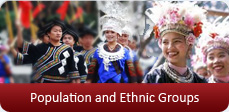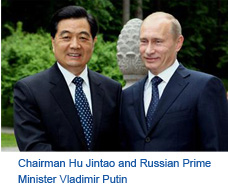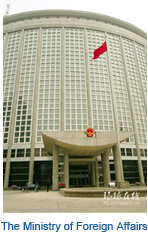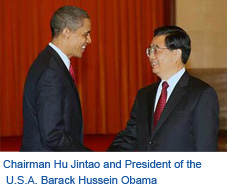






![]() Principles Governing the Establishment of Diplomatic Relations with Other Countries
Principles Governing the Establishment of Diplomatic Relations with Other Countries
With the inauguration of the PRC on October 1, 1949, the Chinese government declared solemnly:  "This government is the sole legal government representing the People's Republic of China. It is ready to establish diplomatic relations with all foreign governments which are willing to observe the principles of equality, mutual benefit and respect for each other's territorial integrity and sovereignty." There is only one China in the world. Taiwan Province is an integral part of the territory of the PRC. Any country seeking to establish diplomatic relations with China must show its readiness to sever all diplomatic relations with the Taiwan authorities and recognize the government of the PRC as the sole legal government of China. The Chinese government will never tolerate any country scheming to create "two Chinas" or "one China, one Taiwan"; nor will it tolerate any moves on the part of countries having formal diplomatic relations with China to establish any form of official relations with the Taiwan authorities. China pursues an independent and peaceful foreign policy directed toward peace. The basic objectives of this policy are to safeguard the independence and sovereignty of the country, strive to create a long-standing and favorable international environment for China's reform, opening to the outside world and modernization drive, safeguard world peace and promote common development.
"This government is the sole legal government representing the People's Republic of China. It is ready to establish diplomatic relations with all foreign governments which are willing to observe the principles of equality, mutual benefit and respect for each other's territorial integrity and sovereignty." There is only one China in the world. Taiwan Province is an integral part of the territory of the PRC. Any country seeking to establish diplomatic relations with China must show its readiness to sever all diplomatic relations with the Taiwan authorities and recognize the government of the PRC as the sole legal government of China. The Chinese government will never tolerate any country scheming to create "two Chinas" or "one China, one Taiwan"; nor will it tolerate any moves on the part of countries having formal diplomatic relations with China to establish any form of official relations with the Taiwan authorities. China pursues an independent and peaceful foreign policy directed toward peace. The basic objectives of this policy are to safeguard the independence and sovereignty of the country, strive to create a long-standing and favorable international environment for China's reform, opening to the outside world and modernization drive, safeguard world peace and promote common development.
![]() Foreign Affairs Organizations
Foreign Affairs Organizations
China's major foreign affairs organizations: The Ministry of Foreign Affairs of the PRC. This governmental unit is in charge of  relations with other countries and consular affairs. There are foreign affairs offices in each province, autonomous region and municipality directly under the Central Government, responsible for handling foreign affairs in those localities under the leadership of the Foreign Ministry. The Ministry of Foreign Affairs has set up offices of special commissioners in the special administrative regions. Such offices shall handle foreign affairs managed by the Central Government and related to special administrative regions, and serve as the channels between the special administrative regional governments and the Central Government on such foreign affairs. The current minister of Foreign Affairs of The People's Republic of China is Yang Jiechi; the current special commissioner of the Ministry of Foreign Affairs in the HKSAR is Lv Xinhua; and the current special commissioner of the ministry of Foreign Affairs in the MSAR is Hu Zhengyue. The Chinese People's Association for Friendship with Foreign Countries Founded in May 1954, this organization's sole purpose is the promotion of friendship and mutual understanding between the Chinese people and other peoples throughout the world. Representing the Chinese people, it makes contacts and promotes exchanges with friendly organizations and people all over the globe. This work allows it to serve as a link in the friendly relations between the Chinese people and the people of the rest of the world. The Association has branches in all the provinces and autonomous regions. The current chairman of the Chinese People's Association for Friendship with Foreign Countries is Chen Haosu. Chinese People's Institute of Foreign Affairs Founded in December 1949, this organization focuses on international issues and foreign policy research, aiming to conduct international exchanges and expand people-to-people diplomatic activities, thus working to enhance mutual understanding and friendship between the Chinese people and the people of other nations, promote the development of China's international relations and contribute to the cause of world peace. This institute works to establish contacts with political activists, diplomats and other distinguished individuals in other countries, along with organizations and scholars researching international issues. It organizes and participates in a variety of public lectures and symposiums on academic subjects and various other activities geared to the exploration of international affairs and exchanges of ideas.
relations with other countries and consular affairs. There are foreign affairs offices in each province, autonomous region and municipality directly under the Central Government, responsible for handling foreign affairs in those localities under the leadership of the Foreign Ministry. The Ministry of Foreign Affairs has set up offices of special commissioners in the special administrative regions. Such offices shall handle foreign affairs managed by the Central Government and related to special administrative regions, and serve as the channels between the special administrative regional governments and the Central Government on such foreign affairs. The current minister of Foreign Affairs of The People's Republic of China is Yang Jiechi; the current special commissioner of the Ministry of Foreign Affairs in the HKSAR is Lv Xinhua; and the current special commissioner of the ministry of Foreign Affairs in the MSAR is Hu Zhengyue. The Chinese People's Association for Friendship with Foreign Countries Founded in May 1954, this organization's sole purpose is the promotion of friendship and mutual understanding between the Chinese people and other peoples throughout the world. Representing the Chinese people, it makes contacts and promotes exchanges with friendly organizations and people all over the globe. This work allows it to serve as a link in the friendly relations between the Chinese people and the people of the rest of the world. The Association has branches in all the provinces and autonomous regions. The current chairman of the Chinese People's Association for Friendship with Foreign Countries is Chen Haosu. Chinese People's Institute of Foreign Affairs Founded in December 1949, this organization focuses on international issues and foreign policy research, aiming to conduct international exchanges and expand people-to-people diplomatic activities, thus working to enhance mutual understanding and friendship between the Chinese people and the people of other nations, promote the development of China's international relations and contribute to the cause of world peace. This institute works to establish contacts with political activists, diplomats and other distinguished individuals in other countries, along with organizations and scholars researching international issues. It organizes and participates in a variety of public lectures and symposiums on academic subjects and various other activities geared to the exploration of international affairs and exchanges of ideas.
![]() Development of Foreign Relations
Development of Foreign Relations
Acting in accordance with the above-mentioned principles, China established diplomatic relations with 19 countries in the 19 months between October 1949 and May 1951. Between the second half of the 1950s and the late 1960s, a large number of newly independent nations established diplomatic relations with China. By the end of 1969, the countries having diplomatic relations with China had increased to 50. In the 1970s, the door was opened, allowing normal relations between China and the United States, and China's legitimate seat in the United Nations and the Security Council was restored. These developments allowed China's foreign relations to enter a new stage. Japan, the United States and other Western countries joined a great number of Third World countries in establishing diplomatic relations with China, raising the total number of countries having diplomatic relations with China to 121 by the end of 1979. In the 1980s, even more countries in Asia, Africa, Latin America and Oceania established diplomatic relations with China. Since the beginning of the 1990s, China has established diplomatic relations with still more countries, such as Israel, the Republic of Korea and South Africa, as well as with the newly independent republics that emerged from the former Soviet Union.
months between October 1949 and May 1951. Between the second half of the 1950s and the late 1960s, a large number of newly independent nations established diplomatic relations with China. By the end of 1969, the countries having diplomatic relations with China had increased to 50. In the 1970s, the door was opened, allowing normal relations between China and the United States, and China's legitimate seat in the United Nations and the Security Council was restored. These developments allowed China's foreign relations to enter a new stage. Japan, the United States and other Western countries joined a great number of Third World countries in establishing diplomatic relations with China, raising the total number of countries having diplomatic relations with China to 121 by the end of 1979. In the 1980s, even more countries in Asia, Africa, Latin America and Oceania established diplomatic relations with China. Since the beginning of the 1990s, China has established diplomatic relations with still more countries, such as Israel, the Republic of Korea and South Africa, as well as with the newly independent republics that emerged from the former Soviet Union.


 WeChat
WeChat Weibo
Weibo 京公网安备 11010102004314号
京公网安备 11010102004314号